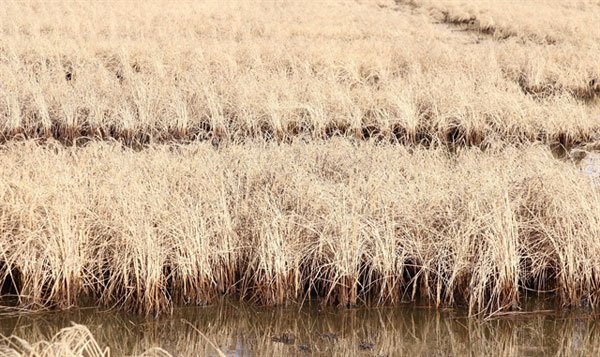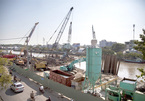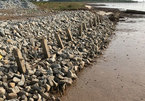 |
| Extended dry weather has damaged the rice crop in many areas in Ca Mau Province. – VNA/VNS Photo The Anh |
Ca Mau is the only province in the Cuu Long (Mekong) Delta that cannot access water from the Mekong and relies mostly on rainwater for irrigation.
Ly Van Lam Commune, one of the largest vegetable growing areas in Ca Mau City, has seen its irrigation canals dry up and farmers struggle to find water for their crops.
Following instructions from local authorities at the beginning of the ongoing dry season, farmers grew only short - term crops like onion, bitter melon, mustard greens, gourds, and cucumber.
To secure water for their vegetables, many farmers have had to drill borewells to draw groundwater. But groundwater has become scarce and farmers drilling now have difficulty finding water.
Mac Ngoc Truyen, chairman of the Ly Van Lam Commune Farmers Association, said the association has told farmers not to grow vegetables on large areas like they did before.
This would help farmers save water, use water meant for domestic use and mitigate the losses caused by the drought, he said.
In Tran Van Thoi District, vegetable farmers are facing a poor harvest because of the lack of water while the prices of vegetables have fallen dramatically.
Vu Dang Khoa, chairman of the Minh Ha Agriculture Service Co-operative in the district’s Khanh Binh Dong Commune, said after Tet (Lunar New Year) members grew pumpkin and gourds.
When the crops began to bear fruit, there was no water and the yield is set to fall by half, he said.
The co-operative’s members have built a temporary dam to store water, but there is not enough to irrigate crops, he said.
Fruit growing areas in the province have been affected by a lack of water and farmers have had to make great efforts to save their fruit trees.
Nguyen Van Thinh, who has a 1ha guava orchard in Tran Van Thoi District’s Khanh Hung Commune, said the leaves of many trees have withered.
He had to prune many branches to save the trees, but many still died, he said.
“The source of irrigation water for the orchard is a river. This year the drought has been severe and the river has dried up.”
The dry weather has been forecast to continue, and agricultural officials have instructed fruit farmers to take measures to save their trees.
Farmers are instructed to use rice straw, dried grass and dried leaves to cover the roots to lock in moisture, and prune branches to reduce the quantity of water required by the trees.
Drought and saltwater intrusion had wholly or partially affected more than 20,500ha of crops including rice in the province as of early April, according to the province’s Department of Agriculture and Rural Development.
Sowing schedules
To mitigate losses to the summer – autumn rice crop caused by dry weather, the department has established farming schedules for various localities.
The province plans to grow a total of 36,000ha of summer – autumn rice in Tran Van Thoi, U Minh and Thoi Binh districts and Ca Mau City.
The schedules require farmers to sow 27,000ha of rice after they finish preparing the land. The remaining 9,000ha will be sown when there are rains. The rainy season normally begins in May.
High-quality varieties will account for 65 – 70 per cent of the province’s summer – autumn rice area, fragrant and specialty varieties for 10 -15 per cent and medium-quality varieties for 10 per cent.
The department has urged farmers to grow more high-quality and fragrant varieties since they are in high demand.
Nguyen Tran Thuc, head of the province Plant Cultivation and Protection Sub-department, said rice farmers should adopt advanced farming techniques to improve quality, reduce costs and improve their incomes. VNS

Mekong Delta takes measures to cope with saltwater intrusion
Saltwater intrusion has occurred on a large scale in the Mekong Delta, forcing local authorities to take measures to protect agricultural production and ensure water supply for household use.

Ca Mau adapts to climate change
As coastal erosion continues to affect thousands of lives in Vietnam's southernmost province, authorities are taking steps to adapt to climate change before the damage reaches irreversible levels.
 Many crop growing areas in Ca Mau Province’s freshwater zones are facing a severe shortage of water because of a prolonged dry spell.
Many crop growing areas in Ca Mau Province’s freshwater zones are facing a severe shortage of water because of a prolonged dry spell.